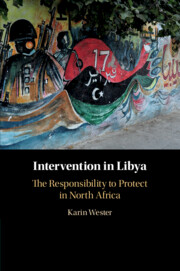Book contents
- Intervention in Libya
- Intervention in Libya
- Copyright page
- Dedication
- Epigraph
- Contents
- Preface
- Maps
- Introduction
- 1 The Origin of the Responsibility to Protect
- 2 Authority Based on Protection in a Historical Context
- 3 Libya and the Era of Qadhafi’s Rule
- 4 The Libyan Uprising and the International Response, February 15–26, 2011
- 5 The Libyan Uprising and the International Response, February 26–March 17, 2011
- 6 Operation Odyssey Dawn
- 7 Operation Unified Protector, NATO, and the UN
- 8 A Divided International Community Confronts a Divided Libya
- 9 Lessons to Be Learned
- Epilogue
- Select Bibliography
- Index
Introduction
Published online by Cambridge University Press: 28 February 2020
- Intervention in Libya
- Intervention in Libya
- Copyright page
- Dedication
- Epigraph
- Contents
- Preface
- Maps
- Introduction
- 1 The Origin of the Responsibility to Protect
- 2 Authority Based on Protection in a Historical Context
- 3 Libya and the Era of Qadhafi’s Rule
- 4 The Libyan Uprising and the International Response, February 15–26, 2011
- 5 The Libyan Uprising and the International Response, February 26–March 17, 2011
- 6 Operation Odyssey Dawn
- 7 Operation Unified Protector, NATO, and the UN
- 8 A Divided International Community Confronts a Divided Libya
- 9 Lessons to Be Learned
- Epilogue
- Select Bibliography
- Index
Summary
In recent years, while Libya has gradually slid into a state of chaos, lawlessness, and violence, the views concerning the international response to the Libyan crisis in 2011 have also shifted noticeably. In 2011, despite the controversy over NATO’s intervention in Libya, numerous actors involved – as well as observers – concurred in their positive assessment of the decision to intervene in the country. The German magazine Der Spiegel qualified the decision as a shift by the UN “from peace to people,” and as “a turning point in international relations”1 – reflecting sentiments echoed elsewhere at the time. Throughout 2011, the intervention in Libya was frequently considered an important step toward a growing acceptance of foreign interference on humanitarian grounds.2 In the summer of 2012, after the first elections in nearly fifty years had taken place in Libya, an academic research report stated, while contrasting the situation in Libya with previous experiences in Afghanistan and Iraq: “In a period in which the future of large-scale interventions is in doubt, the Libyan case may offer precedents for future post-conflict situations.”3
- Type
- Chapter
- Information
- Intervention in LibyaThe Responsibility to Protect in North Africa, pp. 1 - 10Publisher: Cambridge University PressPrint publication year: 2020

